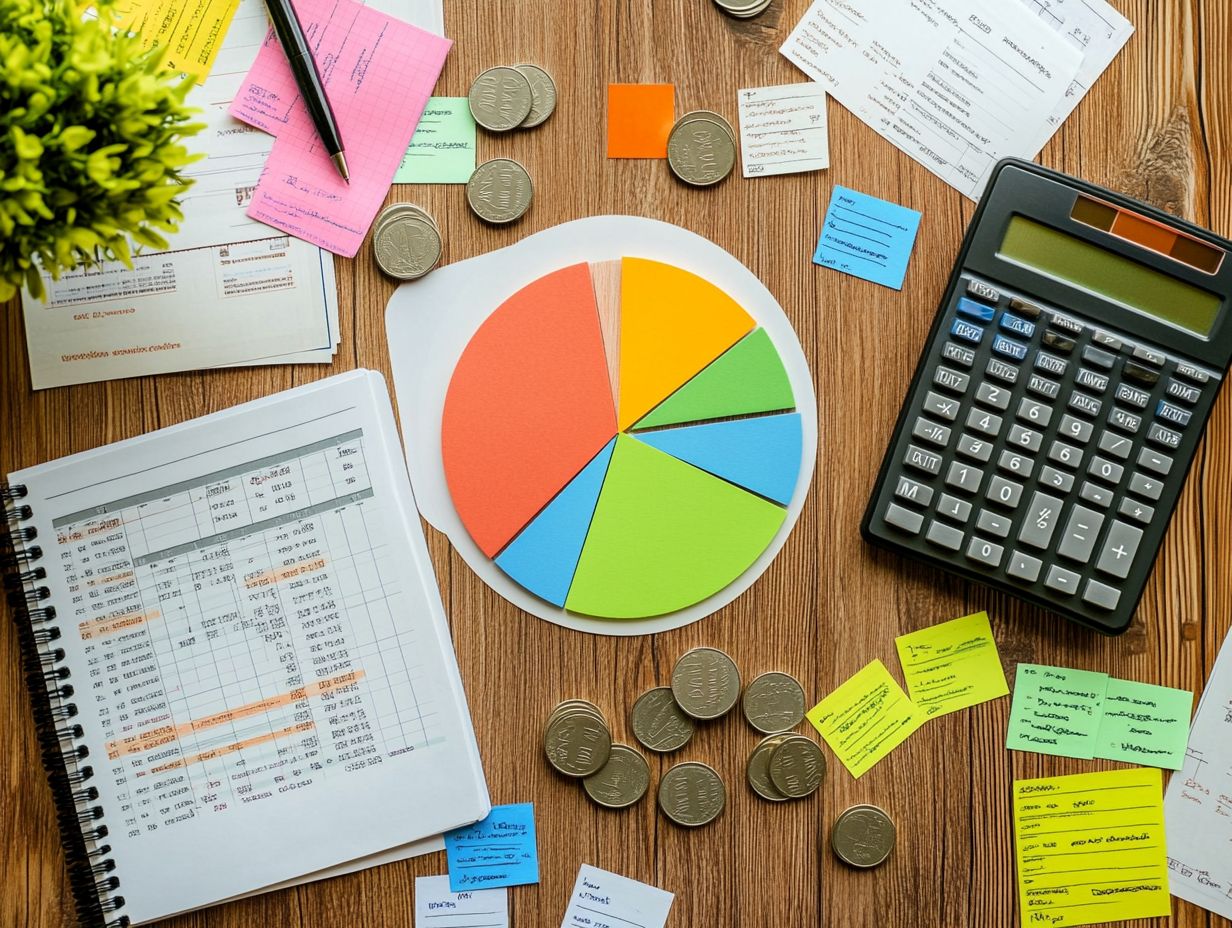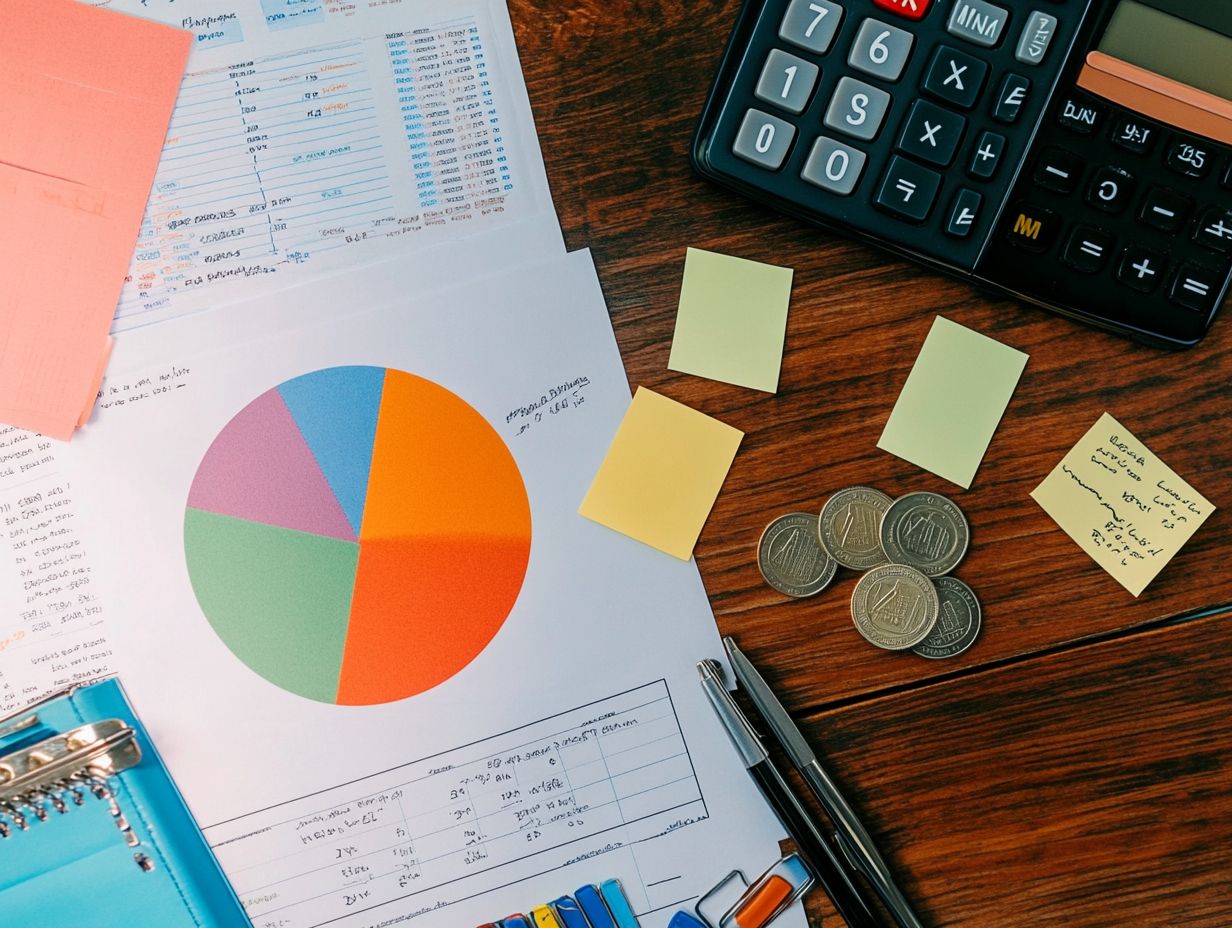What Are the Key Elements of a Budget?
Contents
Key Takeaways:

- A budget consists of key elements such as income, expenses, savings, investments, debt repayment, and emergency fund.
- Creating a budget involves following specific steps and strategies for success.
- Budgeting helps you manage your money and reach your financial goals.
Why Budgeting is Important
Budgeting is a key part of personal finance. It enables you to take charge of your financial management.
By establishing realistic financial goals based on your income, you can track your spending clearly. Understanding your spending habits helps you allocate funds effectively toward essentials, savings, and investments.
This ensures a solid foundation for financial stability and health. A budget creates a clear distinction between fixed expenses, like rent or mortgage payments, and variable expenses, such as dining out or entertainment.
This clarity helps you avoid overspending in any category. Creating a budget also enables you to prioritize saving for emergencies, crafting a safety net for unexpected financial crises.
As you gain confidence in managing your resources, your financial health can improve significantly. This newfound confidence sets the stage for long-term wealth accumulation and the freedom that comes with financial independence.
Key Elements of a Budget
An effective budget has essential components that enable precise financial management. This includes identifying your income sources, categorizing various expenses, setting clear savings goals, and developing strategies for effective debt repayment.
Each element plays a crucial role in fostering financial stability and growth.
Income and Expenses
Income and expenses are the bedrock of any budget. Your net income is the money you take home after deductions, while expenses fall into two primary categories: fixed and variable.
Understanding this distinction is essential for smart financial planning. Fixed expenses like rent, insurance premiums, and loan payments remain steady each month, making them easier to predict.
In contrast, variable expenses, which include groceries, entertainment, and dining out, can vary significantly, requiring a more vigilant management approach.
By accurately calculating your net income and subtracting your expenses, you can unlock valuable insights into your financial health. If you find a higher proportion of variable expenses, it might be time to reevaluate your discretionary spending and enhance your overall budget.
Ready to take control of your finances? Let s dive in and start transforming your future!
Savings and Investments

Savings and investments form the backbone of a well-crafted budget. They propel you toward your long-term financial goals.
Establish a robust savings plan. Don t overlook the importance of savings set aside for emergencies.
Diversifying your investments can change the game for achieving both stability and growth. When combined with a disciplined saving strategy, you can harmonize the act of building a reserve of funds with making informed investment decisions.
By thoughtfully balancing short-term savings with long-term investment strategies, you can confidently navigate your way toward a secure financial future, all while diligently pursuing your personal goals.
Debt Repayment
Debt repayment is a vital part of your financial management journey. This requires you to set aside a portion of your budget to reduce existing debts.
To navigate this effectively, consider prioritizing high-interest debts. Tackling these first can dramatically lessen the total interest you ll pay over time.
Create a detailed budget that clearly outlines your income and expenses. This will help you pinpoint areas to cut back, allowing for larger allocations towards debt repayment.
Utilizing budgeting apps can simplify this process. They make it easier to track your spending habits and establish savings goals.
Additionally, employing the snowball method where you focus on paying off smaller debts first can provide the momentum you need to stay committed to your repayment plans. This approach not only motivates you but also paves the way to financial freedom and peace of mind.
Emergency Fund
An emergency fund is a critical component of your budgeting strategy. It provides the financial stability that serves as a safety net for unexpected expenses.
Start building your emergency fund today. Aim to save at least three to six months’ worth of living expenses.
The ideal amount can differ based on your unique situation, including job stability and health considerations.
Picture this: you re faced with unexpected car repairs or sudden medical bills. Having that financial cushion can save you from the stress of immediate debt.
With an emergency fund in place, you ll experience an enhanced sense of fiscal confidence, which translates into more effective budgeting and future planning.
Creating a Budget
Creating a budget is an exciting journey toward financial freedom! By crafting a plan that aligns with your income and expenses, you enable yourself to adjust your spending habits and achieve your financial goals with precision and ease.
This methodical process clarifies your financial landscape and positions you for long-term success.
Steps to Follow

Following a structured budgeting process is essential for effectively tracking your spending and achieving your financial goals. This enables you to manage your finances with confidence.
Start by conducting a thorough assessment of your income and expenses. This will provide clarity on your financial landscape.
This initial step enables you to categorize various income sources and expenditures, giving you a detailed view of where your money is coming from and where it is flowing.
Make it a habit to regularly monitor and record these transactions. This practice helps you identify spending patterns and ensures you can make necessary adjustments promptly.
Revisiting your budget periodically is vital for adapting to life changes and maintaining your financial health. It allows you to assess your progress toward your goals and make informed decisions for your future.
Tips for Sticking to a Budget
Adhering to a budget demands both commitment and well-crafted strategies that enable you to cultivate positive spending habits while successfully navigating your money goals.
Strategies for Success
Implementing effective budget strategies is essential for achieving success in financial management. These strategies allow you to maintain control over your spending limits and long-term financial goals.
To start, utilizing budgeting apps can offer you a seamless way to track your expenses. This keeps you informed about your financial status in real-time without the hassle. Setting specific spending limits for different categories, like groceries or entertainment, encourages discipline and fosters mindful purchasing decisions.
Being flexible is vital! Adapting your budget can keep you on track, even when life throws surprises your way. Regularly monitoring your expenses can help you identify spending patterns, leading to better decision-making and planning for future needs.
Ultimately, these strategies also significantly boost your overall financial health and provide peace of mind. What strategies do you find most helpful in sticking to your budget?
Watch this video for more tips on budgeting!
Frequently Asked Questions
What Are the Key Elements of a Budget?

The key elements of a budget include income, expenses, savings, financial goals, debt, and money saved for emergencies, known as contingency funds. Understanding key strategies for effective budgeting can help ensure that these elements work together to create a comprehensive financial plan for an individual or organization.
How Does Income Play a Role in a Budget?
Income is a crucial element of a budget as it determines how much money is available to cover expenses and achieve financial goals. It includes all sources of income, such as salary, investments, and side hustles.
What Expenses Should Be Included in a Budget?
All necessary expenses should be included in a budget, such as rent or mortgage, utilities, groceries, transportation, and insurance. It’s important to also factor in discretionary expenses, like dining out or entertainment, to create a realistic budget.
Why Is It Important to Have a Savings Element in a Budget?
A savings element in a budget helps to build a financial safety net for unexpected expenses and future financial goals. It ensures that a portion of income is set aside for the future and can prevent the need to take on debt in times of crisis.
What Role Do Financial Goals Play in a Budget?
Financial goals provide a sense of direction and purpose to a budget. They can be short-term, such as paying off debt, or long-term, such as saving for retirement. Including financial goals in a budget helps to prioritize spending and stay on track to achieve them.
What Is a Contingency Fund and Why Is It Important to Have in a Budget?
A contingency fund is a reserve of money set aside for unexpected expenses or emergencies. It’s important to have in a budget to avoid taking on debt or derailing financial goals in case of unforeseen circumstances, such as job loss or medical expenses.
Ready to take control of your finances? Start budgeting today!






